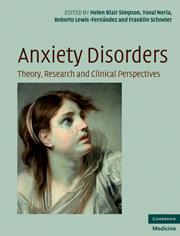Book contents
- Anxiety Disorders
- Dedication
- Anxiety Disorders
- Copyright page
- Contents
- Contributors
- Foreword
- Preface
- 1 Introduction: the need for interdisciplinary approaches
- Section 1 Evolving concepts of anxiety
- Section 2 Challenges in diagnosing pathological anxiety
- Section 3 Understanding the causes of anxiety
- Section 4 Treatment of anxiety: current status and controversial issues
- 22 Evidence-based treatment for patients with obsessive–compulsive disorder: questions and controversies
- 23 Treatment of social anxiety disorder
- 24 Treatment of posttraumatic stress disorder
- 25 Panic disorder and agoraphobia
- 26 Treatment of late-life generalized anxiety disorder
- 27 Childhood anxiety disorders: best treatment options and practice
- 28 Brain stimulation in the treatment of anxiety disorders
- 29 Complementary and alternative medicine approaches to the treatment of anxiety
- 30 The treatment of anxiety disorders in primary care
- 31 Conclusion: gaps in knowledge and future directions
- Index
30 - The treatment of anxiety disorders in primary care
from Section 4 - Treatment of anxiety: current status and controversial issues
Published online by Cambridge University Press: 10 November 2010
- Anxiety Disorders
- Dedication
- Anxiety Disorders
- Copyright page
- Contents
- Contributors
- Foreword
- Preface
- 1 Introduction: the need for interdisciplinary approaches
- Section 1 Evolving concepts of anxiety
- Section 2 Challenges in diagnosing pathological anxiety
- Section 3 Understanding the causes of anxiety
- Section 4 Treatment of anxiety: current status and controversial issues
- 22 Evidence-based treatment for patients with obsessive–compulsive disorder: questions and controversies
- 23 Treatment of social anxiety disorder
- 24 Treatment of posttraumatic stress disorder
- 25 Panic disorder and agoraphobia
- 26 Treatment of late-life generalized anxiety disorder
- 27 Childhood anxiety disorders: best treatment options and practice
- 28 Brain stimulation in the treatment of anxiety disorders
- 29 Complementary and alternative medicine approaches to the treatment of anxiety
- 30 The treatment of anxiety disorders in primary care
- 31 Conclusion: gaps in knowledge and future directions
- Index
Summary
Keywords
- Type
- Chapter
- Information
- Anxiety DisordersTheory, Research and Clinical Perspectives, pp. 348 - 355Publisher: Cambridge University PressPrint publication year: 2010



